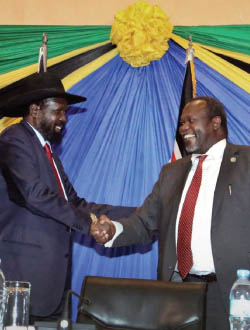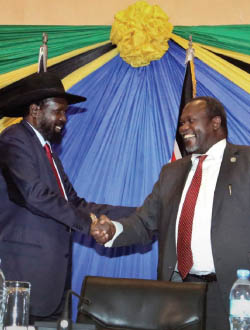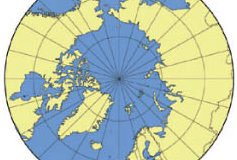Why Is the World (Still) At War?

 Five Reasons for Today’s Missing Peace (and Peace of Mind)
Five Reasons for Today’s Missing Peace (and Peace of Mind)
A WW2 poet said it best: The world is still at war because it is not yet ready for peace.
From Aleppo to Kabul, from the Donbass to West Africa, the world is still at war – even if the great powers are for now generally quiet among themselves. Why is the world not yet ready for peace? Let me offer five general observations.
The first is that war itself evolves, and that its evolutionary possibilities have not yet been fully realized (or exhausted). The world’s 25 richest states are trying to acquire, or have acquired, cyber-warfare capabilities. Seventy-six states are building drones. This is called ‘cultural diffusion’ – copying what others do or invent.
Second, different groups and factions today, from ISIS to Boko Haram, are fighting for their own version or vision of the good life. Americans have gone to war for the last century on the peculiar understanding – to quote George W. Bush in 2002 – that “moral truth is the same in every culture, in every time, and in every place.” But it really is not. The more than 30,000 jihadists who are fighting for ISIS in the Middle East put their religion first. The West Europeans who volunteered to fight for the Republic or Fascism in Spain in the 1930s put the cause before everything. So too, of course, did the Americans who fought in the Abraham Lincoln Brigade.
Third, while the US often claims to be fighting for humanity, most people fight (and often die) for the tribe. People are hard-wired to be cooperative and competitive at the same time – seeking security in membership of a group, variously ethnic, religious or political. War is not, as some would have it, simply the product of the inability of men and women to see relationships with their fellow human beings. Indeed, war is all about relationships: it is about cyber ghettoes – virtual communities of hate that breed in cyberspace – and also about the young male jihadists and jihadi brides who go off to Syria to fight (and die) for ISIS. Death is a sacrament with the group. One must make one’s death, if possible, meaningful for others.
Fourth, the world is at war because people live not just by ideas but also by emotions. Today’s conflicts are in many cases fuelled by resentment and anxiety. The countries at peace are the countries of hope – ones that do not need war because of the stories that they tell themselves. After all, if one genuinely believes that the 21st century will be Asian, Pacific, Chinese, or all of the above, then one is likely to feel at no particular risk. By contrast, the countries of resentment fear that they do not own the future. Many of these include the countries of the Middle East, for which the Arab Spring has turned into the nightmare of an Arab Winter. In Russia, the government, at least, is struggling, in identity and strategic terms, to reckon with the loss of superpower status. And then there are the countries of anxiety: consider the West, which fears, variously in economic and military terms, the Asians, the Arabs and the Russians. This emotional mix is highly combustible.
Indeed, in looking at today’s world, one cannot help but think of Dante’s claim that all crimes are committed out of love – that is, either excessive (lust), or insufficient (envy). This fractured world of fierce emotions is, on this logic, one in which some love God/the nation-state/the ethnic group too much and humanity too little. In other words, this is a world that is fighting not only for the good life, but also for the love of its fellow co-religionists or countrymen. In a recent book, The Worm at the Core, Sheldon Solomon, Jeff Greenberg and Tom Pyszczynski suggest that intimations of mortality are allayed by a sense of community and cultural belonging. And yet, as the authors suggest, people who have responded to death not only undergo a surge of appreciation for their own values, but are also far more likely to dislike the values of other cultures. The logic of war is thus set.
The fifth point is about peace itself. It is what philosophers call a ‘contested concept.’ The Scottish political theorist Walter Bryce Gallie tells us that if one claims that a picture is painted in oil – rather than in watercolour – then the statement is manifestly either true or false. The statement can be validated by the observer. However, if one claims that the picture is a major work of art, then the observer may well disagree on what constitutes a work of art, and even more on whether that work has any peculiar value. To achieve universal agreement, Gallie contends, would require one of three things: creation of a new meaning for the phrase ‘work of art’ – on which everyone could agree; acceptance by everyone, even if by force, of a single meaning; or a declaration to the effect that ‘work of art’ can refer to a number of different concepts – all employing the same name. The latter case, of course, would involve agreeing to disagree.
So what of ‘peace’ as a contested concept? Putting aside the first idea, what of the other two? To force everyone to accept one meaning has been tried: it is called imperialism. The Pax Romana and Pax Britannica were all very real, but they involved constant pacification. And making the world safe for democracy – the universal American project, or instinct – has not proved very popular either. When the US went to war in Iraq in 2003 there were demonstrations in hundreds of cities around in the world, in dozens of countries.
What of the third principle – agreeing to disagree? This is where we really are today, and it is not always very satisfactory. When I visited Lebanon earlier this year, I found a society that, for all its dysfunction, has ostensibly been at peace with itself since the Taif peace agreement of 1989. But what is that peace? Is it exhaustion after many years of war, or merely the absence of fighting? Or does it mean more – including forgetting the conflict, or even forgiving those who fought it? What most people mean by peace is that they won, and the clear winner in Lebanon is Hezbollah. It follows that the peace that obtains there today will continue as long as Hezbollah finds it useful.
But can we – returning to Gallie’s first idea – find a new meaning on which everyone can agree? This seems highly unlikely. Could we claim that a society is at peace when it has striking levels of social inequality (identified at this year’s Davos summit as the most likely source of conflict in the future)? Would a disarmed world be a just world if people could no longer fight for justice as they have in the past? Would we value a peace that meant only the renunciation of war? Could we be at peace with ourselves if we saw injustice in the world every day? Would we really have peace of mind?
Christopher Coker is Professor of International Relations at the LSE. His new book is Future War (Polity Press).











